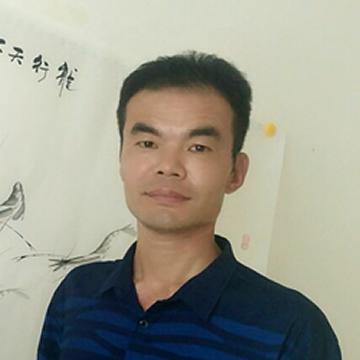序一
昔人写西湖之美,东坡诗固脍炙人口,堪称绝唱。袁中郎写六桥春色,述及断桥至苏堤一带,绿烟红雾,弥漫二十余里,歌吹为风,粉落为雨,罗纨之盛,多于堤畔之草。艳冶极矣。至若张宗子写七月半曦明之景,于月色苍凉之际,纵舟酣睡于十里荷花之中,香气拘人,清梦甚惬。亦足发人遐想。
求之于画,或绘山容水意,窈窕通明;或绘杨柳一络,逶移临风;或绘堤上艳卉,花片沾衣,染映湖水,作胭脂小浪。盖湖光点翠之工,山岚设色之妙,尽夺画家之目睛也。然侔色揣称,写境之静,因物缘情,画心之净者,鲜见之也。古今为画,于寻常景物,率尔下笔,便有佳作;而神幻若西湖者,愈苦心经营,反愈失之。西湖之寂寞无侣,可知矣。
善錞先生酷嗜陶令诗,貴其静而适也。故所绘西湖之景,隐约之间,远意若生,亦静者居其多。其一往所诣,静之至时,虽秋水暮烟,不足为其色也;然姿媚亦从简净中跃出,有苍雪弥丽,秋光初碧之趣,庶几通乎定庵琴曲:“美人沉沉,山川满心。吁嗟幽离,无人可思。”其有物无物,变幻起来,胥归于静寂之界,真乃不暇求静即此静者也。
余每过深圳,则求观善錞之画,虽但知其静中高华,不知其寄意深旨,已翕然倾倒,以为神奇,不待他人艳称也。
课余之暇,闲步湖上,水光静好,山色绰约,因念及善錞画意,写此寄之。
时乙酉五月,半顷荷香已飘渺湖山间矣。范景中。
FOREWORD
Among ancient writings eulogizing the beauties of West Lake in Hangzhou, the poems of Su Dongpo are especially esteemed and have been ranked as masterpieces throughout the ages. Describing spring on the Six Bridges, Yuan Hongdao depicts the view from the Broken Bridge to the Su Embankment thus: “Green smoke and red fog spread out over some twenty li; Fluting songs are like wind, falling pollen, like rain; Fine silk fabrics are more common than the grasses covering the dykes.” What a beautiful description it is! In the Qing Dynasty, the famous writer Zhang Dai portrays himself asleep and dreaming sweetly of floating in a boat over ten li of lotus, savoring dawn and a pale July moon, tasting the lotus’ fragrance. Reading his verse, readers fall into reverie.
As for paintings depicting West Lake scenery, most delineate its colorful features, perhaps a view of willow branches in the wind, or flowers blooming everywhere on the causeway and reflected in waves. These facets of the view captured the artists’ sensual awareness. Few took time to meditate on the scenery’s grace, or harmonize their souls with the inner essence of their surroundings. That may explain why many paintings that depict ordinary scenes may be regarded as great works, while painstaking works can be said to have only superficial resemblance to the West Lake. In this sense, the West Lake needs a truly understanding admirer.
Mr. Yan Shanchun cherishes the poetry of Tao Yuanming and holds dear its compelling peacefulness. In his paintings, the views of West Lake are indistinct, remote and abstract; they embody the quietude of the scene. For the spectator, Yan’s restrained use of ink-wash recalls impressions of an autumn lake, an evening mist, sky blue snow, or the first light of an autumn sun over the lake’s surface. The grand simplicity of Yan’s art corresponds to the artistic ideal of Gong Zizhen who declared that “the real beauty of a maid or a mountain can never be fully appreciated because of its mysterious serenity.” It is not easy to classify Yan’s art as either figurative or not figurative, but I cannot help thinking that his art has reached with ease a state of supreme serenity.
Each time I have visited Shenzhen, I have sought the opportunity to enjoy his paintings. Fascinated by his art, I often felt how masterly are his painting skills and how his art achieves grandeur in its calmness. Others do not easily have the opportunity to share my enjoyment.
These thoughts welled up in my mind as I was taking a stroll along the West Lake; and the parallels between its exquisite scenery and Shanchun’s paintings inspired me to write them down. It is the time of water lotus’ blooming in the lake, and I have smelled their fragrance.
Fan Jingzhong
(Su Dongpo [1037-1101]; Yuan Hongdao [1568-1610]; Zhang Dai [1597-1679]; Tao Yuanming [ca.365-427]; Gong Zizhen [1792-1841]. Trans.)
西方抽象画约分两途,一曰热抽象,一曰冷抽象。热烈者,运气于色,如飓风忽起,侧注斜飞,划然轩昂,未知何底。冷净者,敛气于骨,运笔裁制,寻方计圆,历落有序。Kandinsky与Mondrian并以抽象擅名;一绝去蹊径,畅其精神之发露,后之抽象表现主义步其踵;一善于控驭,欲冥合宇宙之律则,观念艺术衍其流。然求其意与境会,萧然如秋水之远逝者,采览泰西,固无其人也。此殆以人文传统之异。
善淳先生尝感于此,固论之曰:作画之妙,全在意境,有意境者,神韵逸出笔墨彩色之外。余犹记丙戌秋日,善淳自岭南来沪西画展,所示无几,却令人忆绪重重,有味之无极者。其以意境融彻抽象,虽闲漫纤碎处,动色而陈,亦有水月风花之飘渺,置诸春山秋雪间,自觉形神无间,所谓用色艳如高士琴也。余徘徊叹绝久之,不禁歌之以《诗品》佳句。
Western abstract art has developed in two main directions: we might call one direction ‘warm abstraction’; it lays particular emphasis on direct emotional expression in a lyrical, fluid and intuitive way. The other direction, ‘cool abstraction’, aims at creating geometrically ordered and balanced compositions that express universal harmony. Kandinsky and Mondrian, both pioneers of abstract painting, each painted with a different purpose. Kandinsky aspired to evoke a spiritual experience, a deeply intimate connection between the artist and the viewer. Abstract expressionists championed his artistic notion and celebrated spontaneity and the exploration of the self in their paintings. Mondrian, on the other hand, sought to express rational thought – those pure relationships which manifest the immutable unity of reality. The Conceptual Art movement was heavily indebted to his concepts of universal truth. In spite of their differences, abstract artists in Western countries share the yearning to represent the non-figurative in their creations, and practice art as a metaphysical quest for higher meaning. Western abstract art rejected traditional mimesis in order to communicate values and feelings in the visual language of essential forms, colors, and materials.
However, there is a significant difference between these Western ideals and the consummate spiritual insight pursued by traditional Chinese scholar-painters. Mr. YAN Shanchun noticed this difference and he once pointed out that the beauty of a painting consists entirely in its evocation of the human spirit. This evocation calls out to our hearts and transcends the ink and color, the materials and forms of which the painting is made. I still remember that in autumn 2006 Shanchun came to Shanghai from Guangdong and brought a few of his abstract paintings for an exhibition. His artistic creations, embodying the spirit of mountains and rivers, inspired me with a profound nostalgia deep in my heart. Although he uses Western abstract painting methods, his art evokes the visual poetry found in the greatest Chinese paintings. The forms in his art eschew structure and definition, like water, wind, moonlight and fragrance, which one can feel intimately and yet can never grasp or control. His colors are subdued and elegant, like the music of a harp played by graceful and tender hands. This delicate beauty enthralls my senses as I wander about within it, reminded of the encompassing silence of first snow in the foothills, and the meditative insight of fine poetry.
[广告] 作品编号10034163,字画之家保真在售
《禅茶一壶》
鲁叁田作品 / 50×50cm / 软片未裱

 车厚宾,清溪苑主,号虾痴,男,汉族。1974年生于……[查看]
车厚宾,清溪苑主,号虾痴,男,汉族。1974年生于……[查看] 陈坚(本名陈光荣),号石上耕夫、瓦砚斋主人,中国当……[查看]
陈坚(本名陈光荣),号石上耕夫、瓦砚斋主人,中国当……[查看]


